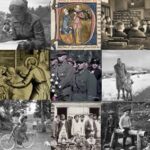 The „Hidden lives: domestic servants in the European country house, c.1700-1850“-Network (Web); Jon Stobart, Manchester Metropolitan Univ. and Göran Ulväng, Uppsala Univ.
The „Hidden lives: domestic servants in the European country house, c.1700-1850“-Network (Web); Jon Stobart, Manchester Metropolitan Univ. and Göran Ulväng, Uppsala Univ.
Time: 21.01.2025
Venue: Uppsala
Proposals by: 18.11.2024
Country house servants were seldom socially or spatially isolated: they were bound into familial and social networks within the country house, in its surrounding communities and even nationally/internationally. This workshop will bring together researchers from a range of European countries to examine how servants’ social and familial networks offered opportunities and systems of support, for example, in terms of recruitment and mobility. It will also explore how networks and relationships within the country house (both with their employer and other servants) were structured by hierarchy, gender and role within the house, but also by legal regulations and constraints. Overall, we seek to further our understanding of the significance of servants’ networks in shaping their lives and in offering a deeper understanding of the country house as a lived space.
The organisers invite papers on any aspect of servants’ networks and relationships, but especially encourage contributions that focus on:
– how servants’ networks changed over the longue durée
– the role of familial networks in the recruitment of servants
– servants’ relationships with their employers
– servant networks and hierarchies within country house
– geographical or social-network approaches to servants’ networks
– the impact of service in the country house on social status
Funds are available to help defray travel costs, with priority given to ECRs. Overnight accommodation will be provided by the organisers. Proposals of c.300 words, a short biography, and an estimate of travel costs to Uppsala should be sent to Jon Stobart (j.stobart@mmu.ac.uk) and Göran Ulväng (goran.ulvang@ekhist.uu.se) by 18th November 2024.
The network (Web)
This AHRC-funded network „Hidden lives: domestic servants in the European country house, c.1700-1850“ brings together heritage professionals and researchers from a range of disciplines and countries to share research on the lives of servants in country houses across Europe: a surprisingly neglected area that has Continue reading

 The Cultures of Philosophy project at the Univ. of Exeter
The Cultures of Philosophy project at the Univ. of Exeter  Seventh Annual HEX Conference 2025
Seventh Annual HEX Conference 2025